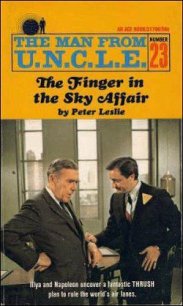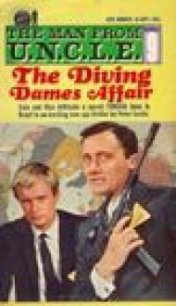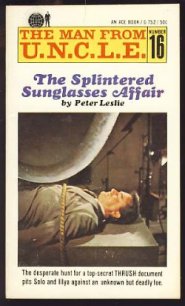[The Girl From UNCLE 04] - The Cornish Pixie Affair - Leslie Peter (электронная книга .txt) 📗
![[The Girl From UNCLE 04] - The Cornish Pixie Affair - Leslie Peter (электронная книга .txt) 📗](/uploads/posts/books/56865/56865.jpg)
Жалоба
Напишите нам, и мы в срочном порядке примем меры.
[The Girl From UNCLE 04] - The Cornish Pixie Affair - Leslie Peter (электронная книга .txt) 📗 краткое содержание
[The Girl From UNCLE 04] - The Cornish Pixie Affair читать онлайн бесплатно
THE GIRL FROM U.N.C.L.E. No. 4
The Cornish Pixie Affair
PETER LESLIE
Based on the MGM television series
The Girl from U.N.C.L.E.
CHAPTER ONE: MURDERER'S SHY
MIST, drifting across the sea as the sun rose, had been dispersed by a westerly breeze before the first fishing boat chugged out of the harbour. By the time the cracked bell of the town-hall clock spelled out eight o'clock, the wind had freshened and veered two points to the north, ripping the sky into ragged banners of cloud that streamed over the moorland which cradled the port and shrouded the gaunt bulk of Trewinnock Tor a mile and a half along the coast road towards The Lizard. Half an hour later, as those few shopkeepers whose shops remained open in the winter walked, rode or pedalled to work, it began to rain.
It was a thin rain, more of a drizzle really, drifting in over the cliffs, in gusts across the sea wall, pitting the surface of the swell which heaved at a line of yachts in their canvas covers and rocked dinghies at their moorings. But it was penetrating too — and soon the shallow slate roofs of the pink and white-washed cottages, themselves reflected in the shining streets, were glistening along each side of the valley leading to the cove.
Around the granite Customs House, water chortled in the old guttering and splashed down ramps slanting past lobster pots and rusty winches towards the beach. The rain blew in through windows and doors, formed puddles around the bandstand by the lifeboat station, and drenched the subtropical foliage sheltering stonework and porch. It cascaded down the steep hill winding back to the main road. It dripped from eaves and buttresses and balconies, and swelled the pools which lay among the sagging awnings of a circus above the town...
And it saturated the body of a girl which was slumped across the flimsy counter of a sideshow booth.
There was a garish red and yellow sign above the booth announcing: Koko, The Naughty Clown — Pelt Him As Hard As You Like And Teach Him A Lesson! Twelve Shies A Shilling! And then, sprawled forward through the plastic curtains which normally parted only to reveal the bobbing clown's head as it ducked to avoid the hurled balls of corn pressed cotton, was the body…
Below a tweed coat dark and sodden with moisture, the girl's head hung down over the front of the counter. Her hair, long and blonde, was tangled and matted by the rain. One arm was caught behind her by the curtain; the other, flung forward with the fingers of the hand outstretched, seemed in its despairing attempt to grasp nothing only to accentuate the lifelessness of the figure as a whole. Collapsed there in the gaudy framework of the booth, the girl looked like a puppet whose strings had been cut.
But there was visible evidence of a more sinister kind.
The lightweight cotton balls with which the clown in the sideshow was pelted were stacked in a bin behind the curtains. But on the muddy ground outside, three iron-hard wooden spheres from a neighbouring coconut shy lay wetly beneath the corpse's lolling head.
Although the circus was laid up for the winter in the big field at the head of the valley, the sideshows and amusement arcades were opened each afternoon to allow the proprietors to make some of their running costs from the townspeople and the occasional visitor during the close season. Towards the end of the morning, therefore, there was a stirring around the double line of caravans beyond the closed Big Top, and soon men and women were hurrying across the waterlogged grass to prepare the attractions for the coming day.
At twelve-thirty, a teenage boy shouted in astonishment into the wind, and a few minutes later there was a knot of people grouped around the kiosk home of Koko The Naughty Clown.
Shielding his face from the driving rain with an upraised arm, the boy hared back to the caravans. Two minutes later, he returned. Behind him, picking his way over the grass and ducking under guy ropes, an old man in a flat cap followed. Under the awning of a shooting gallery, there was a discussion going on, with gesticulation and argument. The man in the cap walked to an elderly Buick parked at the far end of the field, coaxed the motor into life, and drove through the gate and down the road looping towards the huddle of wet roofs round the harbour.
Soon afterwards, the car returned, accompanied by a black police Wolseley. Helmeted constables in shining raincapes arranged a tarpaulin screen around the booth while an officer in a peaked cap with silver stars on his shoulders interrogated the circus staff.
Half a mile away, a man parked on a shoulder of the lane, climbed the bleak moorland towards Trewinnock Tor and focussed a powerful pair of Zeiss field glasses on the scene. By now another police car had arrived and he could see the occasional flare of photographers' flashbulbs from behind the screen. Faintly above the pounding of the rain on the car roof, the watcher heard the shrilling of bells. An ambulance lurched into the field and backed up to the booth. Later, a Fire Service salvage tender arrived, hesitated near the Big Top, and then turned and slowly crawled back down the hill into the town.
A policeman was standing at the gates trying to move on a sprinkling of those sightseers who materialise, like swallows on the first day of summer, anywhere in the world at the first hint of a disaster, private or public. Others shepherded members of the circus staff towards one of the caravans in which the officer with the silver stars appeared to have made his headquarters. Presently a third police car whined down the hill from the main road leading to Helston and disgorged three plainclothes men who quickly busied. themselves about the booth.
The man with the binoculars seemed to find all this of equal interest. Even when everyone had disappeared inside the caravan, the kiosk, or one of the other tents in the field, leaving only the massive figure of the constable at the gate, he continued to stare at the site, raking the flaps of wet canvas inquisitively from time to time.
The rain stopped eventually. The sightseers straggled away to lunch. Policemen crossed and recrossed the wet grass beneath the scudding clouds.
But it was only when white-coated ambulance men shuffled out of the booth carrying a sheeted figure on a stretcher that the watcher relaxed. Momentarily, his knuckles whitened around the eyepieces of the glasses. Then, when the ambulance doors had slammed shut and the vehicle had bumped over the field and out into the road, he sighed, dropped the binoculars back into a leather carrying case slung around his neck, started his car, turned round and drove slowly back down the hill towards the town.
News of the death at the circus spread rapidly around the bars and cafes of the port, for a murder is a rare occurrence in a Cornish fishing village, and everybody felt sure the girl had met with foul play.
The ambulance men discussed it in the hospital canteen. The police surgeon, the county coroner, and the Chief Constable theorised in the smoking room of the Conservative Club. Local newspapermen enthused on the telephone over the event as they called the News Editors of the London dailies they represented.
And a fair-haired young man at the wheel of a sports car talked about it over a short-wave radio as he thundered southwest from the capital that night.
For the dead girl, besides earning a modest living as the holder of a sideshow concession at the circus, had also been working for an organisation based three thousand miles to the west across the Atlantic — an organisation identified by the curious initials of U.N.C.L.E.
CHAPTER TWO: MARK GETS SET
THE Crabbers' Delight at Porthallow is one of those peculiarly English pubs, bulging with horse brasses and copper pans and spurious souvenirs, which despite its Olde Worlde atmosphere still manages to attract a clientele of genuine locals. It stands just across the Hard from the Customs House, and behind it there is a green lawn sloping down to the bathing beach on the other side of the cove where customers sit and drink in the summer.




![[The Girl From UNCLE 01] - The Global Globules Affair - Latter Simon (читаемые книги читать txt) 📗](/uploads/posts/books/56868/56868.jpg)